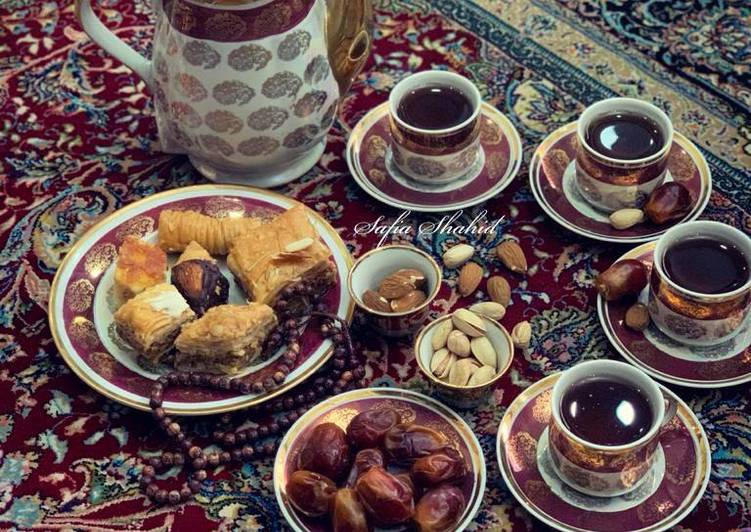Arabic kahwa (Arabic Chai). The word Kahwah in Kashmiri means "sweetened tea", though the word also seems to be related to the Turkish word for coffee (kahveh) which in turn might be derived from the Arabic word "qahwah." Traditionally Kashmiri Hindus have always referred to kehwa as Mogul chai. Meaning this tea was introduced in the valley back then by the Mughal emperors. A light taste of well blended spices that come together as an aromatic warm beverage adored by the finest tastebuds.
 Qahwa is a traditional Arabic Coffee Recipe that is most popular Arabian cuisine.
Qahwa is made from green coffee beans and cardamom.
It is often served with dates.
You can cook Arabic kahwa (Arabic Chai) using 4 ingredients and 4 steps. Here is how you achieve that.
Qahwa is a traditional Arabic Coffee Recipe that is most popular Arabian cuisine.
Qahwa is made from green coffee beans and cardamom.
It is often served with dates.
You can cook Arabic kahwa (Arabic Chai) using 4 ingredients and 4 steps. Here is how you achieve that.
Ingredients of Arabic kahwa (Arabic Chai)
- You need 4 1/2 of kahwa cup water.
- It's 1/2 tsp of tea.
- It's 2-3 of cardamoms.
- It's of Honey (optional or serve with dates).
It is served from a special coffee pot called dallah and the cups are small with no handle. Qahwa is fragrant, a traditional favorite drink in middle-eastern countries. It is a vino-colored tea normally served with dates as traditional tea and Arabic coffee in most Arab countries especially in Kingdom of Saudi Arabia. It is also called Kahwa Tea in some of the Asian countries.
Arabic kahwa (Arabic Chai) step by step
- Boil water for 1 minutes And add the ingredients..
- Boil for at least 3-4 minutes..
-
Strain in kahwa cups..

- Serve and enjoy with dates and arabic sweets..
Arabic Qahwa is of unique blended flavors that differ from our traditional western coffee. I am sure that after trying it once, you will continue to crave for it over and again. It is served on almost all the prestigious functions in Saudi Arabia and generally served in business meetings as well. It is normally served with high-quality dates. Arabic-Kahwa / Shay (kah wa / shay) Chinese-Kāfēi /Chá (Ka Fay / Cha) Croatian-kava / čaj (kah vuh / chai) Czech-káva / čaj (KAH vah / chai) Finnish-kahvi / tee (kahh vih / teh eh) French-café / thé (café / tay) German-kaffe / tee (coffee / tea) Italian-caffè / tè (caff fay / tay) Japanese-Kōhī / Koucha (Kooh Heeh.